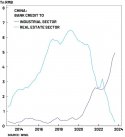The financial market in China, unfortunately, really doesn't matter as an indicator of the Chinese economy.
China's fastest growth period -- the entry into WTO and the immediate years that followed was basically the trough of China's stock market.
View attachment 135507
Now if China had listened to the economists using the market as proxy then they would have adversely impacted the policies of the greatest period of growth China (or any large economy) had ever seen.
This period where China was growing massively between 8 and 14% (until the US financial crisis struck in 2008) also coincided with the absolute nadir of China's modern stock market:
View attachment 135508
The stock market in China, again while unfortunate, really does not reflect the Chinese economy.
What the US could do with its stock market simply can't be done in China because the maturity was never there and like most developing nations it hadn't yet created the financial gravity (which includes reputation created over time) needed to pull in international funds and at the same time limit the chaos created by hot money.
Furthermore, the financialization of companies in like the US is definitely not something that China wants or can afford at this stage.
China is looking at long term health in its top firms while stockholders are looking to maximize annual profits and share prices. Capex uglifies the ledger books and the profit margins but that is what China Inc. does best. That is how China as a developing nation catches up. It can't afford to be paying excessive dividends. It needs its firms to invest for the future.

